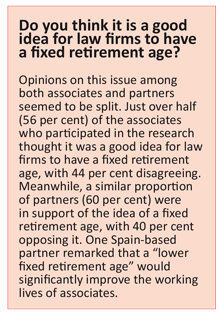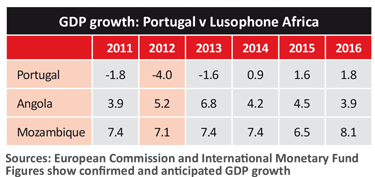It´s good to talk
New research shows that the associates in law firms in Spain and Portugal want law firm leaders to be more transparent and better communicators
How can law firms in Spain and Portugal improve the lives of their associates? Many younger lawyers feel that their firms are not open enough about targets and financial performance, while some others object to the fact that their weekends and holidays are too often disturbed by work commitments. Meanwhile, others believe that they are given insufficient training or are too infrequently consulted about changes and new initiatives at their firm. However, keeping associates motivated is by no means an impossible task and a few organisational tweaks could make a significant difference.
To mark the tenth anniversary of the publication, Iberian Lawyer conducted a comprehensive survey of more than 130 associates in Spain and Portugal to find out about their experiences. Why? Because attracting and retaining the best young talent is identified by many managing partners in Iberia as the biggest issue they face. We also surveyed more than 130 partners in Spain and Portugal to explore the extent of the possible ‘disconnect’ between senior and more junior lawyers. So this research encapsulates the opinions of more than 270 lawyers – part one of our report was published in our last issue, here we present the rest of the findings and look at possible solutions to the problems that have been highlighted.
Transparency within law firms, or rather the lack of it, is a major grievance among associates. Two-thirds of associates (65 per cent) said that their firm was not sufficiently transparent with its lawyers in relation to the firm´s “financial performance, targets or progress”. One respondent said the working lives of associates could be improved if promotions and bonuses at their firm “were given in a more transparent way”, while another associate said their firm needed to provide more clarity regarding “bonus attribution criteria”.
How can firms address these problems? Increasing the amount of feedback, as well as providing updates on progress, appear to be among the ways in which firms could improve. “There should be regular meetings for feedback,” remarked one participant. “Also there should be evaluations of lawyers’ progress every year in order to know professional progress and goals for the next year.”
Other comments included the need for “improved disclosure and discussion about the firm’s plans”, as well as calls for increased “communication and transparency between partners and associates – the hierarchic level of progression should be respected in the sense that associates are no longer trainees and some of them have legitimate expectations about becoming partners”.
Too hierarchical?
However, getting this message across to partners may prove difficult. The vast majority of partners think their firms provide associates with enough information about the firm’s finances and goals – a total of 75 per cent of partners in Spain and Portugal think their firm is sufficiently transparent in relation to financial performance, targets and progress. But one partner acknowledged that his firm was failing in this area – they said the working lives of associates could be improved if there were “clear career schemes with objective and measured targets which make them grow in their careers”. The partner added that their firm needed “sounder planning with regard to internal education”. Another partner admitted that firms “need to be more open and be less hierarchical”.
Most associates feel they are consulted enough when it comes to new initiatives at their firm. A total of 61 per cent said they believed they were given “sufficient input into innovations at their firm”. Most partners (82 per cent) shared the same view. However, it seems that one in three associates wish they had a bigger say on changes at their firm. One said life at their firm would be improved if associates were given “more respect and more involvement in the strategy of the business”. Some associates criticised their firms more generally for not taking steps to modernise. When asked what had surprised them most since they began working for a law firm, one associate spoke of the “lack of innovation”, with another remarking that there was “little innovation” at their firm.
Most associates (69 per cent) are confident their firm is effectively using, and adapting to, new technology. However, almost a third (31 per cent) are not. One associate at a firm in Spain said he had been surprised by the “large amount of paper used, despite the fact that most information should be electronically stored”. In contrast, the overwhelming majority of partners (91 per cent) believe their firm is effectively using, and adapting to, new technology. However, one Spain-based partner said associates’ lives would be improved if their firm “invested more in technology and changed the way work was organised”.
Lack of support
However, one in three associates (34 per cent) feel their firm does not give them enough support staff to effectively perform their duties. One associate said there was “no good support from paralegals or secretaries”, while another Portugal-based associate said their firm needed “better paralegals and IT support staff”. Meanwhile, another associate highlighted the general shortage of support staff at their firm.
Almost half (45 per cent) of the associates in Spain and Portugal do not take all their holidays each year. Is this a problem? It is for some – one associate remarked that there should be “more respect for holidays, meaning that you should not be contacted while on holidays unless it is strictly necessary”. Another commented that life at their law firm would be improved if there was more “quality of life, time to spend with family and friends without prejudice to our career”.
So what lessons can law firms learn from this research? As was revealed in the first part of our report – which appeared in the last issue of Iberian Lawyer – the fact is that most partners (52 per cent) acknowledge that the legal profession is not as attractive to young people as it used to be. Judging by the comments of associates who participated in our research, the main issues law firm leaders need to address generally fall into four main categories which, in order of importance, are:
1. Work-life balance: Allowing associates to spend more time with their families, take more of their holidays without being disturbed, and, at the very least, enjoy more free weekends than they do at present could have a significant impact on morale. The introduction of more flexible working hours could perhaps also be considered.
2. Transparency: Being more open about the firm´s financial performance and strategy could have an impact in terms of fostering a greater sense among associates of belonging to the firm they work for. This could be coupled with clearer career plans as well as information about what is necessary to achieve partner status. Giving associates input into the development of the firm´s strategy.
3. Training: A more structured and professional approach to training would be welcomed by many associates – this could involve giving associates more time attend courses and seminars, as well as generally providing more resources for training.
4. Communication: Associates would appreciate it if there was greater clarity about deadlines so they are better able to prioritise their work. At a more basic level, a common wish among associates was for generally more communication with partners including more frequent feedback and appraisals.
While the above measures could go a long way to making many associates happier, it should be noted that a significant number of associates already find their careers extremely rewarding. Associates remarked that by working with very demanding people they were able to achieve more, and they also commended the best partners at their firm for their impressive knowledge of business. Meanwhile, others were pleasantly surprised at how freely partners gave their time to help and guide younger lawyers. In addition, some associates remarked on the positive atmosphere at their firm and the fact that they were trusted from the outset. As one associate said: “I was surprised by the good ambience between colleagues and the responsibility I was given from the very first moment.”
Achieving a successful work-life balance is not always easy, but it is not impossible. A number of partners who participated in our research highlighted possible solutions to the problem. One partner in Portugal said his firm should foster a culture where associates “get enough relaxation time, and time off”. Meanwhile, a Spain-based partner remarked that the working lives of associates would be improved by “probably offering them less money, or expectations of making less money, but having more time for themselves, and persuading them that this is good”. But is this realistic? Some would say not. As one partner remarked: “If they [associates] want to be partners, then the answer is quite simple: work a lot, try to be excellent and get as many new clients as you can – it is worthwhile, in my opinion.” IL












